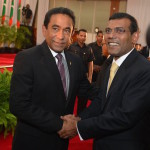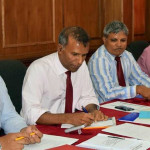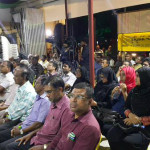Treatment from private hospitals and clinics will be covered under the “Aasandha” universal health insurance schemes from August 1, with an agreed amount to be charged from people going to those clinics.
According to a statement released by the Aasandha Company on Sunday, private clinics are being included in the scheme after they agreed to a revised price list for health services with the National Social Protection Agency (NSPA).
The scheme will cover the treatments from those private clinics based on the revised price list, while the clinics are allowed to charge their patients to cover any additional costs.
“Therefore, patients will likely have to share the costs of outpatient care and other services,” the company adds.
The authorities have not revealed the amount to be charged, but State Health Minister and National Social Protection Agency (NSPA) Board Chairman Thorig Ali Luthfee told local media that the “charge will not be a burden to the patients.”
“In addition to what is being (covered) from Aasandha, they might charge a small amount from the patient. Once they agree to the price with us, they cannot alter that price,” Thorig told Haveeru.
According to Thorig, four clinics have so far agreed to the prices, and Aasandha services will be offered at the clinics as soon as the agreements are signed.
Price negotiations with several other clinics are still reportedly pending as over 60 private healthcare providers have applied for Aasandha coverage.
According to the Aasandha website, the scheme currently covers treatment from IGMH, ADK Hospital, IMDC Hospital in Addu and other hospitals and health centres currently operated by state-owned health corporations.
Thoriq observed that privately-owned ADK, the second largest healthcare provider in the country, will also have to confirm the revised prices agreed with NSPA to keep providing Aasandha services from next month on wards.
Under the parliament-approved scheme which commenced in January, all Maldivian citizens will receive government-sponsored coverage up to Rf100,000 (US$6,500) per year, including further provisions to citizens who require further financial assistance. Expatriate workers are also eligible for coverage providing their employers pay an upfront fee of Rf1,000 (US$65).
MDP’s critical response
Following the decision to charge patients at private health premises, the former ruling Maldivian Democratic Party (MDP) which initiated the universal insurance scheme, under its affordable healthcare pledge, contended that the government’s decision reflects attempts to “restore the tradition of begging to afford health care services”.
According to the statement released by the MDP, the agreement signed between Aasandha company and the government explicitly states that no amount can be charged from the patients.
“The agreement signed by the Finance Ministry, Health Ministry and Aasandha Company explicitly states that no amount should be taken in fees or as any other charge from the people,” the statement reads. “Therefore, we condemn the coup government’s attempts to charge people a fee for healthcare services.”
The party also accused the government aligned Progressive Party of the Maldives (PPM) and coalition alliance of deliberately attempting to sabotage the health insurance scheme.
The MDP noted that while the party was in power it had regularly made the payments to Aasandha company as per the agreement, however, the incoming government of President Dr Mohamed Waheed Hassan Manik had not made the payments, pushing the scheme to the brink of collapse.
Aasandha is a public-private partnership with Allied Insurance. Under the agreement, Allied splits the scheme 60-40 with the government. The actual insurance premium is paid by the government, while claims, billing and public awareness is handled by the private partner.
Aasandha Managing Director Mohamed Shafaz told Minivan News last week that the government had failed to cover weekly premium payments as agreed under the Aasandha contract since March 2012.
He alleged that while the scheme was continuing to run, the shortfall in state funding was creating some difficulties for service providers such as hospitals and pharmacies both in the Maldives and outside the country in the wider South Asia region.
Without detailing specifics, State Health Minister Luthfee said that the government was presently involved in consultations to clear outstanding bills. He added that a target of 30 days had been set to try and settle outstanding debts to creditors.





No surprsie. All the money has gone to the oligarchs and paying the police and army to keep us from an election. Now investor confidence is down and we have no international donations we are doomed. The super rich will be richer however!!
So, the ordinary suffer but the govt hire extra Police, shorten work hours and give payrises to themselves. Horrible!!!
Yep let's bribe civil servants and police and mndf and let the rest of the population bear the brunt of the financial burden. I guess as Dr Samad says there can't be any free health cover until he gets free fish. Somebody send the guy some free fish and we may have some hope of getting free health cover.
In Australia (where I live) the public health insurance scheme (Medicare) covers only a percentage of the total health fees. Further, most of the Australians (who are employed) have to contribute 1.5% of their annual income to the Medicare scheme.
A good move but nowhere near sufficient.
A country of our income cannot afford a welfare scheme of this size if it is to be non-contributive.
This whole scheme was politicized from the start. The current administration should be praised for making this change while knowing that they would take hits from the opposition.
A few good things always come about in every administration. Nasheed was somehow convinced to restructure and expand the government's taxation base. Although he struggled to dupe the masses into thinking that GST is levied on businesses rather than the end customer, he did suffer for the move politically.
This administration has also been forced by the economic situation to revise a scheme that would have paid for second-rate medical care at the expense of all other vital services such as education, business-facilitation etc.
@tsk tsk!
You can stick up your ideas up that dark channel and administer your own pick!
It is not you who suffer and need more cash!
It is the poor who suffer and need service!
This is total bullhit! This administration is a rebel administration who only knew how to bring down Nasheed's government but had no idea how to manage it!
When will the services be available at the clinic.
@Aussie: Bless YOU Brother - you are much more Aussie than me I think! Kudos to you man - I agree with you - the POOR of this world - in Islam AND Christianity, are the closest to Allah, or God or whichever terminology you use. In the Qur'an it says that a nation dooms itself when there is social injustice, when the rich are favored above the poor. The term in the Qur'an for the poor is Masakin, and it Commands us in MANY MANY AYAT to care for the poor as they are the closest to Allah, and, enter paradise first. It commands us to struggle for them (4: 75).
From Bukhari and Muslim
'A Muslim is not a Muslim until he desires for himself that which he desires for his brother.'
Prophet (SAW) Al-Bayt (His Household), and Suhabbin, almost starved to ensure poor were fed, mocked Muslims for treating slaves differently to themselves!
Compare the self sacrificial love of the Prophet to those in power in Maldives!
HOW DARE MALDIVES calls itself a one hundred percent Muslim nation, calling itself such is just making Islam look...
@Anthu
If you have lived in Maldives in the past 5 years, you would dare compare Maldives and other coutries, especially such developed like Australia.
When medicare started where you live, Maldives was still living in coral houses with thatch roof, and i guess you were not born. we just saw development yesterday and with 30 years of dictatorship, denial of education...very few people would understand the Australian concept.
I agree with you that nothing is all free like before, but first lets educate people before imposing new rules that they have no clue about.
You sound so genuine....dont get drowned in the political war, learn more and come back after 5 years and the country would be ready for you!